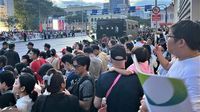Vietnam is bracing for a significant moment in its history as it prepares to commemorate the 50th anniversary of the end of the Vietnam War on April 30, 2025. This milestone is marked not only by a large-scale military parade but also by growing tensions regarding international participation, particularly from the United States. Recent reports reveal that the administration of former President Donald Trump has instructed U.S. diplomats to abstain from attending the celebrations, a decision that has sparked a response from Vietnamese officials.
On April 24, 2025, Pham Thu Hang, the spokesperson for the Vietnamese Ministry of Foreign Affairs, addressed the media, expressing uncertainty about the accuracy of reports from The New York Times regarding the U.S. stance. "Vietnam is not clear about the 'accuracy of this information' from The New York Times," she stated, emphasizing the importance of the April 30th celebrations as a moment to honor peace and reconciliation.
The New York Times had reported that the Trump administration ordered U.S. diplomats, including Ambassador Marc Knapper, to avoid events commemorating the war's end. This directive has raised concerns about its potential impact on U.S.-Vietnam relations, which have seen significant improvement in recent years. "The victory of April 30 is a victory of conscience, of justice, ending the painful losses not only for the Vietnamese people but also for countless American families," Pham emphasized, highlighting the shared history between the two nations.
Despite the U.S. diplomatic absence, many high-level leaders and representatives from various political parties have accepted invitations to Vietnam's April 30th ceremony, including some from the U.S. Pham noted that many individuals outside the U.S. government, such as veterans and researchers, are planning to attend the events related to this significant date. This indicates a continued interest in fostering ties, even amid official diplomatic challenges.
As Vietnam prepares for the celebrations, it is also mindful of its image on the international stage. Recently, the Vietnamese government removed a controversial poster showing a dove perched on a punctured U.S. military helmet near Hoan Kiem Lake, a decision likely influenced by the current diplomatic climate. The poster was intended to welcome the 50th anniversary of the liberation of the South and national reunification but was deemed too provocative given the sensitive nature of U.S.-Vietnam relations.
In a broader context, the April 30th celebrations will feature a military parade that includes participation from neighboring countries such as Cambodia, Laos, and China. The parade will commence from the Nguyen Binh Khiem intersection, proceed along Le Duan Street, and pass the historic Independence Palace, ultimately splitting into four directions. Notably, the parade route will also pass by the U.S. Consulate General in Ho Chi Minh City, underscoring the juxtaposition of Vietnam's historical narrative against the backdrop of current diplomatic tensions.
The significance of April 30 extends beyond Vietnam's borders. For many Vietnamese refugees living abroad, this day is marked as a day of mourning, referred to as the day of national grief. The contrasting perspectives on this date highlight the complexities of Vietnam's historical memory and the ongoing reconciliation process between the two nations.
Researcher Nayan Chanda commented on the implications of the U.S. decision, stating, "This demonstrates a very different attitude from the United States compared to previous administrations. I don't know, it's hard to say, but perhaps this will hinder the process of consolidating relations, somewhat interrupting the ongoing reconciliation efforts." He noted that American veterans' organizations, which had previously been encouraged to foster relations and friendship with Vietnam, may now face more challenges due to the current administration's stance.
As the April 30th celebrations approach, the diplomatic landscape remains fraught with historical significance and contemporary implications. Vietnam's commitment to honoring the values of peace, reconciliation, and healing stands in stark contrast to the U.S. government's decision to withdraw its diplomats from these commemorative events. The upcoming celebrations will not only mark a pivotal moment in Vietnam's history but also serve as a litmus test for the resilience of U.S.-Vietnam relations moving forward.
In summary, the 50th anniversary of the end of the Vietnam War represents a dual narrative—one of celebration and remembrance for Vietnam, and one of reflection and mourning for many Vietnamese abroad. As the world watches, Vietnam's ability to navigate these complex dynamics will be crucial in shaping its future relations with the United States and the broader international community.

